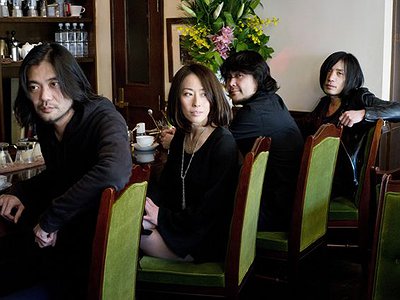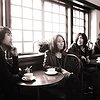The relationship between music and other forms of art – painting, video art and cinema most importantly - has become increasingly important. How do you see this relationship yourself and in how far, do you feel, does music relate to other senses than hearing alone?
Music is a visceral, spiritual experience. It has the ability to communicate a sort of transcendence from the chaos of everyday living. Music and film have a very deep relationship so we see ourselves collaborating with filmmakers more in the near future.
There seem to be two fundamental tendencies in music today: On the one hand, a move towards complete virtualisation, where tracks and albums are merely released as digital files. And, on the other, an even closer union between music, artwork, packaging and physical presentation. Where do you stand between these poles?
I think we're closer to the second group because we enjoy releasing records with artwork and packaging. There is just something timeless about tangible records and seeing a live show.
The role of an artist is always subject to change. What's your view on the (e.g. political/social/creative) tasks of artists today and how do you try to meet these goals in your work?
It's almost impossible to keep up with this rapid change because technology is evolving and everyone has access to the same tools now. But I think this also means that many people will want to dig deeper and search for the things that truly make them engage.
The one constant will be whether or not your work makes people connect and feel something. So the only thing we can do as artists is to continue creating with joy.
Music-sharing sites and -blogs as well as a flood of releases in general are presenting both listeners and artists with challenging questions. What's your view on the value of music today? In what way does the abundance of music change our perception of it?
Music is definitely more accessible now, so I think there will be a greater focus on the relationship between the artist and the audience. There will still be listeners who want to be part of a live show experience and connect to the musicians.
How, would you say, could non-mainstream forms of music reach wider audiences?
Mainly by word of mouth, especially because of all the social media and websites now. Even when MONO started, social media was nothing back then, but our music spread by of word of mouth. We are truly thankful to our listeners for this. I think people will want to share their experiences with other people more.
Usually, it is considered that it is the job of the artist to win over an audience. But listening is also an active, rather than just a passive process. How do you see the role of the listener in the musical communication process?
Instrumental music in particular is an interactive experience because the listener must use his/her imagination. We are not spoon-feeding you any words or meaning, so you have to decide for yourself what it may mean to you. We enjoy films, stories, and all art forms that leave space for the imagination, so perhaps this is why we’ve chosen this route.
Music may trigger a dream you had, something that filled you with joy, something you regret, a moment of sadness that you overcame, or something spiritual that cannot be explained. It’s up to the listener. For me, instrumental music creates the energy that helps me confront these emotions.
Reaching audiences usually involves reaching out to the press and possibly working with a PR company. What's your perspective on the promo system? In which way do music journalism and PR companies change the way music is perceived by the public?
Unfortunately, I am so out of touch with the music journalism world so I cannot give a fair answer. I will say that I am grateful to those who listen to our music and give an honest review. This has helped spread the word about our music.
Please recommend two artists to our readers which you feel deserve their attention.
You can read and hear more MONO at monoofjapan.com



